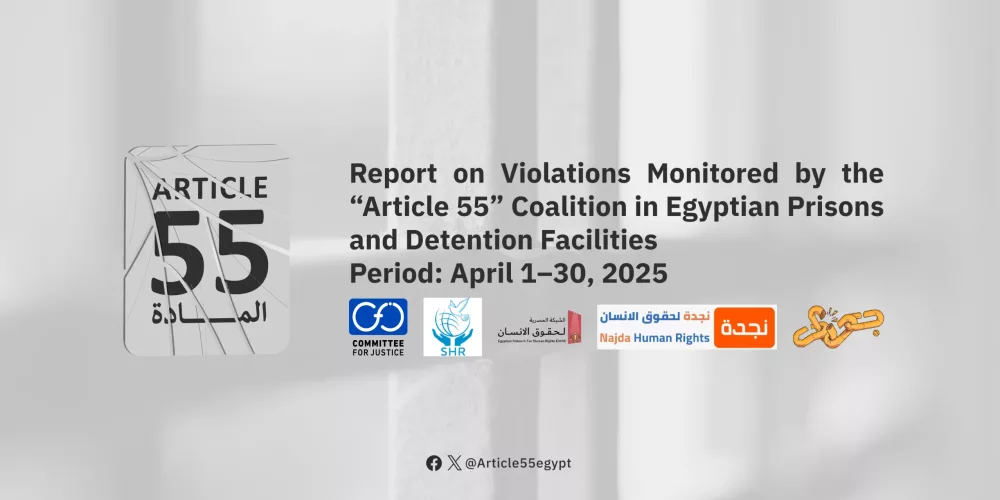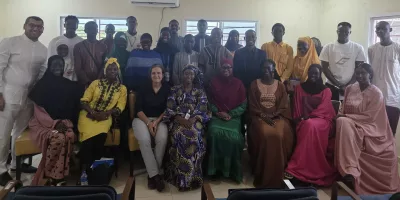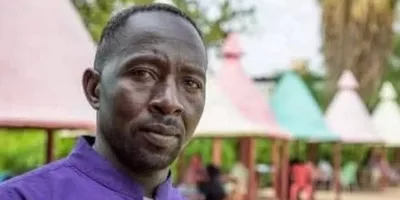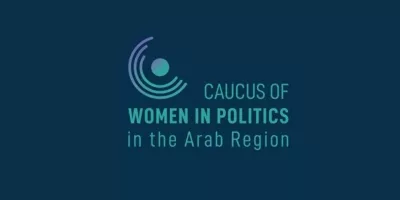The organizations participating in the “Article 55 Alliance” have issued their monthly report to highlight the most prominent human rights, political, and judicial developments in Egypt during April 2025, as well as to expose a dangerous escalation in the rate of serious violations taking place inside prisons and detention centers.
1- Human Rights, Judicial, and Political Developments:
With the arrival of April 2025, Egyptian regional relations witnessed escalating tensions following Israeli statements calling on Egypt to dismantle certain military installations recently established by the Egyptian army in Sinai — a move Egypt rejected as an interference in its sovereignty.
Domestically, the repressive security policy remained unchanged, with the presidential pardon list issued on the occasion of Eid al-Fitr — which included 2,777 prisoners — excluding any prisoners of conscience or political detainees. Instead, new arrests were carried out, including that of Ahmed Abdel Moneim Aboul Fotouh, son of the former presidential candidate, who was arrested while renewing his car license based on a ten-year default prison sentence against him.
The hunger strike by university professor Laila Soueif and her son, Professor Alaa Abdel Fattah, continued in protest against Alaa’s arbitrary detention despite having completed his legal sentence. Additionally, lawyer and human rights activist Mohamed Abu Hriera entered an open-ended hunger strike since March 1st, 2025, and was recently transferred to the prison hospital under critical health conditions.
The month also saw activist Ahmed Douma summoned by the Supreme State Security Prosecution on charges related to a social media post he published about the death of a detainee. Likewise, former potential presidential candidate Ahmed El-Tantawi was summoned for interrogation before prosecutors decided to release him.
On the judicial front, the Bar Association rejected the decision issued by the Cairo Court of Appeal to increase judicial fees, describing it as unconstitutional and illegal, and implemented escalatory measures in response. Meanwhile, the Egyptian Parliament finally approved the new Criminal Procedures Law, despite widespread legal and human rights objections warning that it threatens fair trial guarantees and expands law enforcement powers without judicial oversight.
2- Deaths and Violations Inside Detention Facilities:
In light of the ongoing disregard by Egyptian authorities for repeated human rights calls, and the increasing rate of serious violations within detention centers and prisons, the Article 55 Alliance documented a series of shocking violations committed against detainees across various prisons and police stations throughout April 2025.
These violations did not stop at physical and psychological torture alone but extended to include deliberate medical negligence, deprivation of basic elements of dignified life, enforced disappearances, extrajudicial executions, and deplorable detention conditions that now pose a direct threat to detainees’ lives. Below are the most notable cases recorded during the month:
1- Deaths Inside Detention Facilities (8 Cases):
- Abdel Fattah Mohamed Abdel Mokhtar: Died on April 2, 2025, inside his cell at Gamasa Prison after his health deteriorated due to poor detention conditions.
- Mohamed Hassan Helal (32 years old): Died inside the Intensive Care Unit at Kasr Al-Ainy Hospital in Cairo after being transferred in a coma from Badr 3 Prison, suffering injuries suspected to be the result of systematic physical abuse or assault.
- Saad Abu Al-Einen: Died inside Al-Asr Prison (Ramadan 10th Prison) after being deliberately denied necessary medical care.
- Hamdi Youssef Hashem: Died on April 20 inside the medical center of Al-Asr Prison, suffering from lung cirrhosis alongside chronic illnesses such as diabetes and high blood pressure, yet receiving no adequate medical treatment despite prolonged deterioration of his health condition.
- Yasser Mohamed El-Khashab: Died inside the hospital of Badr Prison during an open-heart surgery procedure.
- Mahmoud Asaad: Died at Al-Khalifa Police Station in Cairo as a result of torture, according to his family’s distress call, which indicated clear signs of abuse on his body after autopsy.
- Youssef El-Sarhani and Faraj Raba El-Fazari: Were executed cold-bloodedly outside the scope of the law after being handed over to security forces in Matrouh , without any trial or legal procedures.
2- Suicide Attempts and Collective Punishments:
The organizations documented an attempted suicide by detainee Ali Gamal (20 years old) inside Badr 3 Prison, resulting from repressive measures including isolation and confiscation of personal belongings. Following the attempt, protests erupted inside the prison and were met with violence by prison administration and rapid intervention forces, leading to injuries among detainees.
At Borg El-Arab Prison in Alexandria, prison authorities launched a wide-scale campaign to strip detainees of clothes and personal items, transferring four political detainees — Mansour El-Sayed, Ala El-Wanash, Abdul Rahman Saleh, and Mohamed Al-Bandari — to Al-Wadi Al-Gedid Prison as a punitive measure after they objected to the confiscation.
3- Deteriorating Health Conditions of Sick Prisoners:
Sayyed Ayman Abdel Nabi (21 years old), detained at Al-Marg Police Station, suffers from severe pulmonary tuberculosis (TB) and is held in a narrow corridor between detention rooms without any medical isolation or proper healthcare, increasing the risk of disease spread.
Sultan Omaran , detained since 2015, began an open-ended hunger strike protesting his arbitrary transfer to a notorious wing known as the “Dawa’i Wing ,” amid harsh living conditions threatening his life.
In light of these continuous and systematic violations, the Article 55 Alliance affirms that the situation inside prisons and detention centers reflects the general policy adopted by Egyptian authorities toward detainees — particularly political detainees — a policy rooted in neglect, torture, deprivation of basic human rights, and the absence of any accountability or oversight mechanisms.
The alliance calls upon international human rights organizations, the European Union, and the international community to take immediate action and exert pressure on Egyptian authorities to launch an independent and impartial investigation into all violations documented during April 2025 and to hold the responsible parties accountable in accordance with national and international law.
Skip to PDF content





